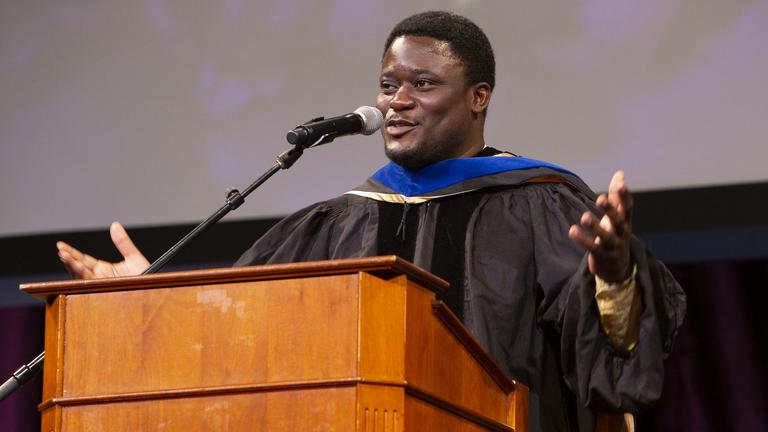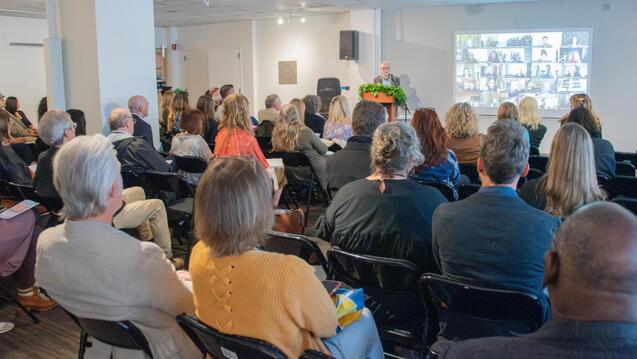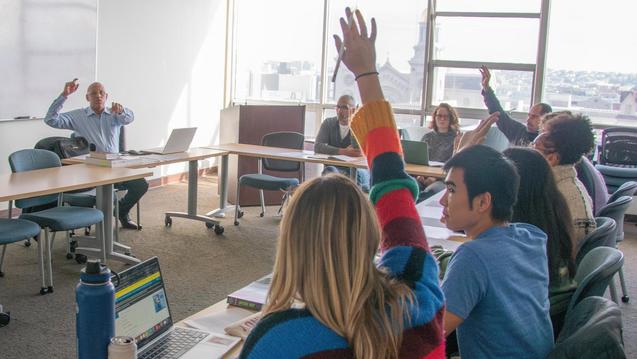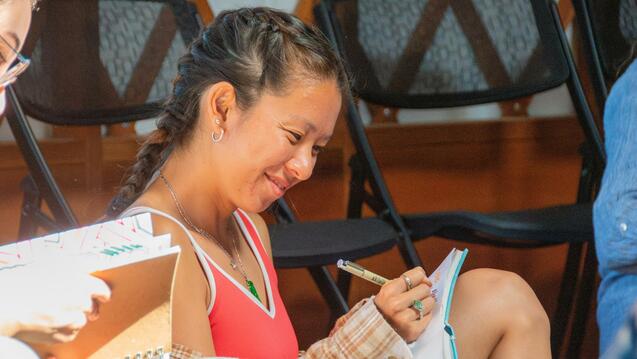
Bayo Akomolafe Addresses the Class of 2023: Coming to the Edges
Keynote Speech at the 55th Convocation Ceremony of the California Institute for Integral Studies
Bayo Akomolafe, Ph.D., author, fugitive post-activist public intellectual, Yoruba poet, and founder of the Emergence Network, delivered the Keynote Speech at the 55th Commencement Ceremony of the California Institute for Integral Studies (CIIS). He was bestowed an Honorary Doctorate of Philosophy and was introduced by Dr. Rene Dumetz, Program Chair of Clinical Psychology.
My name is Adebayo Ifedapo Bamidele Akomolafe. I am Alethea’s father and Kyah Abayomi’s father. I am the infinitely privileged cosmos companion, life-partner, and fragilely composed husband to EJ, son of Olufunmilayo Ibidapo Akomolafe and Ignatius Abayomi Akomolafe, brother to my dear sisters, uncle, and somewhat famous nerd.
Some of you know me; most of you probably don’t.
I’ll tell you something I’m not supposed to. In fact, I was warned by the President not to tell you this, but I’m going to do it anyway: the organizers of this beautiful celebration were terribly excited about the speaker for this year. And so after some quick deliberation, some anxious words of encouragement, crossed fingers and toes, they held their breaths and sent an email...to Snoop Doggy Dog. But he was filming an ad with Martha Stewart. The Wu Tang Clan said no. Tom Cruise’s secretary said he’s off to space and quite unavailable. And Vin Diesel – well, let’s just say he is filming “one last ride.”
My shameless attempt to impress you with my knowledge of Americanisms aside, my point is, I don’t quite fit the bill: I wasn’t even on the list of options. I’m an off-the-list, off-the-books, off- the-record compromise choice. So, I thought I’d stick true and lean into the hidden wealth of being off-the-record by offering you an off-the-list speech in the following sense: I’m not here to encourage you. I’m not here to motivate you, to urge you at this potent time and place to believe in yourself considering your achievements in your fields of study, to tell you that you can make it if you try hard – all the contractually obligatory things I ought to say. I’m not even here to say to you that you can change the world. Quite to the contrary, I’m here to offer a strange proposition whose value rests not in its worthiness as a truth statement but in its intriguing inversion of the stories we tell about the world and ourselves. It is this: that you can’t. That it is not about you. That the world is not reducible to problems and solutions. And that you will not save the day.
I am here as a politician of a stowaway politics, a rhizomatic and autistic politics that meanders and gestures but never arrives. A politics that is learning to be humble in the face of loss, in the tides of grief. I am here because this moment exceeds us: a prophecy of silence whispers to us as the world burns that this...this place is where we fall down.
I’ll tell you a story.
One morning during a holiday in Richmond, Virginia, I stood up and promised my two-year- old daughter that I’d say yes to anything she asked of me that day. If she wanted me to play with her dolls all day, I’d do it. If she wanted to splash around in paint, I’d do it. If she wanted me to dance naked on the streets, I’d try to do it. It is an experiment I have never repeated since I tried it six years ago.
Alethea got the memo. She had an idea, seemingly banal and inoffensive: let’s go swimming, she said, jumping all over the place. I couldn’t swim to save my life, but I figured there was no trouble to wading in the shallow end of the neighbourhood pool. We started on our way. Soon, she began to do strange toddler-like things: on the way, she insisted that what was very clearly the pool was not in fact the pool. She urged us in another direction, pointing at a lake. Apple in throat, I pressed on with her proposal. Then she insisted I take off my slippers and try to wear hers instead. Like we were standing on holy ground.
Eventually, we got to the pool-cum-lake. But instead of going in, she stood silent. Strangely so. The silence was beginning to feel awkward, so I attempted to end it by offering a story to her about her people and her unique Afro-Asian heritages. I wanted to tell her about the Igbo and Yoruba peoples of West Africa, about the Tamil people in South India, about her grandfathers she never met. As I opened my mouth to speak, she said: shhh! This is where we shush. It was the most sacred shush I had ever witnessed.
When the UN’s Intergovernmental Panel on Climate Change released its sixth report on the state of the planet this past March, I thought again about that shush. I thought about our frantic efforts to save ourselves, how our solutions and justices ironically reinforce the very realities and rationalities we are trying to exit. I thought about how very stuck modern civilization is. How very much in trouble it is.
Even if you don’t quite get it, even if you don’t think it’s that much of a deal, all of us gestating within modernity’s worlding project are entangled with the production of this story of impending doom. We are racialized within this narrative of fire on the mountain, the fire this time. Justice doesn’t seem adequate to the moment. A crack has opened in the middle of the road, and we are trying our best to close it up. Our politics tells us we need more time, more expertise, more serious-minded folk and less play, more exceptional individuals, more money, and more inclusionary activisms.
But there is a corrupting addendum to this anthropocentric urge for more: that all we do to respond to this crisis is also a part of the crisis.
I think the stability afforded us by whiteness – the social arrangement that stole not just Black bodies, but white bodies, brown bodies, mottled and fungal bodies – is hollowing out. White stability is flailing. Something is pulling the seams apart, a geophilosophical force is dis/engineering the machine, disrupting the myth that we are stable individuals, overwhelming our borders and boundaries. That obstacle, that impediment, that glitch, that crack, that thing that gets in the way, is wisdom. Yes, wisdom is not so much a profusion of knowledge as it is the transversal disruption of knowing. Wisdom is what remains when we’ve come to the end of everything we know. Wisdom is where the arched back of the road rises and stretches, withdrawing its endorsement of convenient human mobility. Wisdom is where the world kicks back. Wisdom signals the passing of a wild, troubling thing.
Wisdom is also the place a two-year old child silences her father. The place of the shush. The place we are invited to listen, to touch tenderly and be touched, to stray away from the algorithms of the modern, to grieve, to know loss as the prolific gift of a cosmos always in migrancy. To fall-apart-together. What gets in the way is part of the way.
Here’s my invitation then to you bearers of the burdens of these thresholds: shush. Seek out the cracks, for god is the crack. The breaks, the places where rationalities that hold us hostage to modern subjectivity bleed into a non-legible otherwise.
This generation of seekers must never forget that death is not the threat; justice is not the exclusive goal. Our work must be to convene a fugitive politics that does more than get even; a politics that allows us exile from sensorial capture, from the sensorial monoculture that subjectivizes us as surveillance pieces. A politics that allows us experiment with wandering, with desire, with loss as gift. A politics that allows us to shapeshift.
Our work must be to make sanctuary together – not for us to be safe, but for the crack to thrive, to grow, to become resilient. Because the crack – the generatively incapacitating place of our deepest failures to rise to the image of the Man – is the path to the exquisite.
To you at the edges of whiteness, to all of us at these Alethean edges, I invite you to follow the wandering lines; permit yourselves the grace to fail. Failure is the motif of the fugitive. If our noble successes gave us the Anthropocene, it is perhaps our sensuous failures that might usher us to a multi-species arrangement even justice cannot articulate. I invite you not to walk straight, not to always see things so clearly – for clarity obscures much more than it reveals. I invite you to dance with the thresholds to the songs offered by the place where the river romances its impediments.
What lies beyond justice? What lies beyond social mobility or success? What lies beyond Black excellence? Are there colours we don’t know or have a name for? Words we don’t know how to pronounce? Worlds we cannot sense? Maybe there’s a logic in the shush we do not yet know. An invitation within the hull of the slave ship. A mysterious prayer at the edge of the lake only our children can lead us to.
Let me end my off-the-record, fugitive sermon by bringing my opening story to a close as well. There, in that place of silence, by that lake in a curated neighbourhood in Richmond, Virginia, I was met with the queering of time, a stranger abundance hidden behind the corners of the obvious. It wasn’t just the vibrant orchestra of things that struck me: ducks a-quacking, ants a- scurrying, lichens a-lichening, and rippling flows that murmured to me that I wasn’t alone, and that the myth of the hero is indebted to the monstrous sprawl of becomings. It wasn’t just that. It was their prayer urging me to attend to the thrilling and troubling idea that enchantment was and has never been in short supply.
I turned to my daughter, who was now knee-deep in the mud, her little hand, held aloft, spooning a little mountain of dirt in its creases. She said to me: “Here, Dada! Eat this!”
So, I did.
Nope. I didn’t. I ended that experiment there and then and hauled our mismatched feet to our apartment.
But that experiment is no longer mine alone. It is ours. Those Alethean edges are everywhere. The place of the shush. To listen, to be defeated over and over again (in the words of Rilke); to be humbled; to be brought to that thin place where we are forced to exclaim, like Jodie Foster in ‘Contact’: “They should have sent a poet!”
This is the site of our deepest work. I’ll meet you there.
Related News
Over 370 participants gathered at CIIS to honor Jung’s 150th birthday in a transformative exploration of psyche, purpose, and collective healing.
Your roadmap to becoming a licensed clinical psychologist through CIIS' integral, holistic approach to doctoral training and professional practice.
Discover your fit among CIIS' five counseling psychology concentrations, each offering a unique path to becoming a transformative healer.



